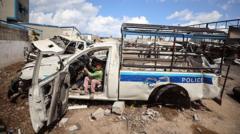Has Hamas Lost Control of Gaza? Insights from a Security Officer

The Collapse of Hamas Control in Gaza: An Insight into the Current Security Crisis
The ongoing conflict in Gaza has led to a significant shift in the power dynamics within the region. A senior officer in Hamas's security forces recently revealed that the organization has lost about 80% of its control over the Gaza Strip, resulting in armed clans filling the void left behind. This alarming situation has escalated due to relentless Israeli strikes that have dismantled Hamas's political, military, and security leadership. The officer, who spoke to the BBC under the condition of anonymity, provided a candid assessment of the internal disintegration of Hamas and the deteriorating security situation in Gaza.
The Impact of Israeli Strikes on Hamas's Leadership
The conflict, which escalated sharply after the Hamas-led attack on Israel on October 7, 2023, has inflicted severe damage on Hamas's command and control structure. The lieutenant colonel emphasized the catastrophic consequences of these strikes, stating, “Most of the leadership, about 95%, are now dead.” This staggering loss has led to a complete collapse of security across Gaza, a territory that Hamas once governed with an iron grip.
As the conflict continues, the officer indicated that Israel has the upper hand, with the international community remaining largely silent. He highlighted the dire conditions in Gaza, where criminal gangs are rampant, societal structures are crumbling, and the remnants of Hamas's control are virtually non-existent. “Logically, it has to continue until the end,” he noted, suggesting that the conflict may persist until a decisive resolution is reached.
The Failure of Hamas's Attempts to Regroup
In the wake of intense military pressure, Hamas attempted to regroup during a 57-day ceasefire earlier this year. The organization sought to reorganize its political, military, and security councils. However, since the end of this ceasefire in March, Israeli forces have targeted what remained of Hamas's command structures, pushing the group further into disarray.
The officer's assessment underscores a critical shift: “The security situation… has completely collapsed. Totally gone. There's no control anywhere.” This vacuum has not only led to widespread looting of Hamas properties but has also created an environment where armed clans operate with impunity. The officer recounted how even the most significant Hamas security apparatus, Ansar, was looted without any intervention from the group's remaining forces.
The Rise of Armed Clans in Gaza
With Hamas's security apparatus effectively dismantled, a power vacuum has emerged, allowing armed clans to gain prominence. According to the officer, six armed groups affiliated with local clans are now active throughout Gaza, particularly in the southern regions. These groups are well-funded, equipped with weapons, and have gained a significant following among the local populace.
One prominent figure emerging from this chaos is Yasser Abu Shabab, who has captured the attention of both local and regional players. His group has reportedly received support from the Palestinian Authority and even weapons from Israel. The officer confirmed that Hamas has placed a significant bounty on Abu Shabab, fearing that he could unite various factions against the group. He stated, “If the Hamas fighters find him, they might go after him instead of Israeli tanks.”
Abu Shabab’s Growing Influence
Reports indicate that Abu Shabab is actively working to coordinate with other armed factions to establish a unified front aimed at toppling Hamas’s authority. His growing influence has alarmed Hamas, which recognizes the potential threat he poses as a unifying figure for its adversaries. A retired Palestinian security official remarked that Abu Shabab's network is gaining traction, likening his situation to “an orphaned child who everyone will want to adopt if he succeeds in undermining Hamas rule.”
This potential for coalition-building among various groups poses a significant challenge for Hamas, which has spent years cultivating enemies across different factions. The officer's warning about the organization’s willingness to eliminate Abu Shabab is indicative of the desperation within Hamas as it fights to maintain its dwindling control.
The Consequences of Lawlessness in Gaza
The ongoing lawlessness in Gaza has led to entire neighborhoods descending into chaos, with armed gangs operating freely. The Hamas security officer emphasized that anyone attempting to restore order faces immediate danger, stating, “Anyone who tried to act on their own… was bombed by Israel within half an hour.” This environment of fear and insecurity has left the population vulnerable, with rampant theft and violence becoming commonplace.
The implications of this breakdown in law and order extend beyond immediate safety concerns. The social fabric of Gazan society is being torn apart, as families struggle to meet basic needs in the face of widespread looting and violence. The officer added, “Salaries are delayed, and when they do arrive, they’re barely usable. Some die just trying to collect them.” This grim reality contributes to a pervasive sense of despair among the populace.
The Future of Hamas and Gaza's Security Landscape
As the conflict continues, the future of Hamas and the security landscape in Gaza remains uncertain. The organization is not only grappling with external pressure from Israeli forces but is also facing increasing challenges from rising rivals within the territory. The potential for a unified front against Hamas could signify a seismic shift in the region's power dynamics.
The officer’s dire predictions suggest that unless significant changes occur, the situation in Gaza may continue to deteriorate. “Hamas's control is zero. There's no leadership, no command, no communication,” he stated, highlighting the severity of the crisis. The rise of armed clans and the potential for coalition-building among rival factions could lead to a complete reconfiguration of power in Gaza.
Conclusion: A Call for Awareness and Understanding
The current state of Gaza illustrates the complexities of conflict and power in a region marked by longstanding divisions and external pressures. The collapse of Hamas's control has paved the way for new power dynamics, with armed clans emerging as significant players in the ongoing struggle for control. As the situation unfolds, it is crucial for the international community to remain aware of the implications of this crisis, not just for Gaza but for regional stability as well.
In light of these developments, the question remains: What will be the long-term consequences of Hamas's disintegration, and how will the rise of armed clans shape the future of Gaza and its people?
Frequently Asked Questions
What caused the collapse of Hamas's control in Gaza?
The collapse of Hamas's control in Gaza is primarily attributed to relentless Israeli strikes that have decimated the group's leadership and security structures, leading to a power vacuum filled by armed clans.
Who are the armed clans now operating in Gaza?
Currently, several armed groups affiliated with local clans have emerged in Gaza, with one of the prominent figures being Yasser Abu Shabab, who is working to unify various factions against Hamas.
What impact does the lawlessness in Gaza have on its residents?
The lawlessness in Gaza has led to widespread violence, theft, and insecurity, making it difficult for residents to meet their basic needs and contributing to a breakdown of social order.
The situation in Gaza is complex and evolving rapidly. As we watch these developments unfold, what do you think the future holds for the region? #GazaCrisis #Hamas #SecurityInGaza
Published: 2025-07-06 16:20:09 | Category: technology



